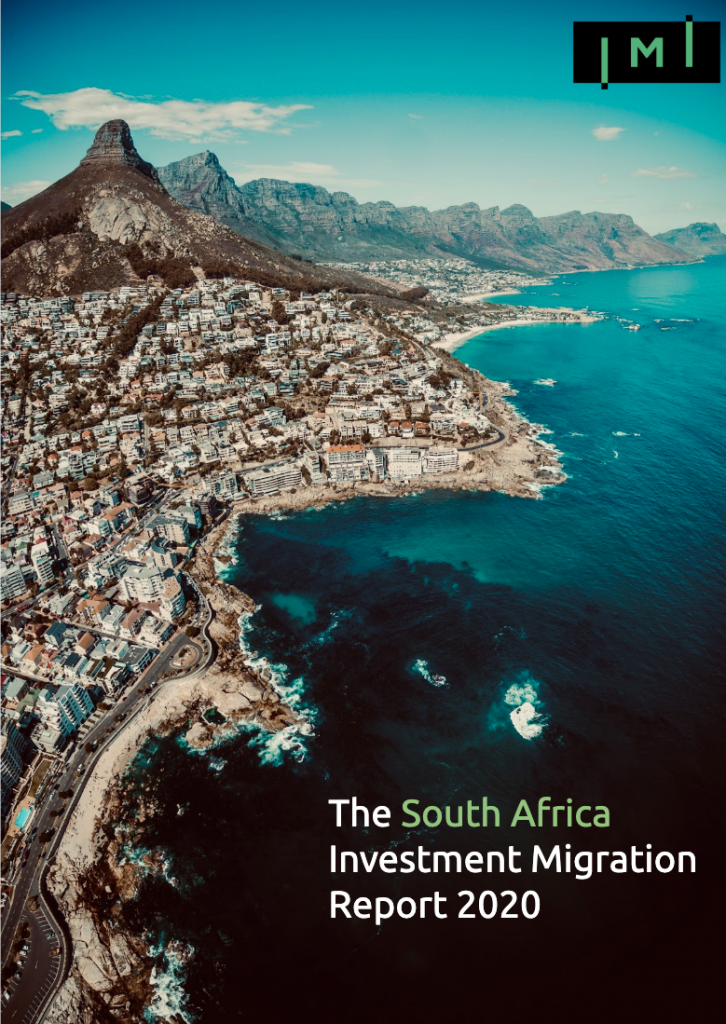Nearly 1 in 5 South African HNWIs Cite “Emigration” as Reason For Selling Homes
The below is an excerpt from the South Africa Investment Migration Report 2020.
Following a drastic devaluation of the Rand in 2014/15, the number of HNWIs in South Africa rose steadily until 2018. For 2019, Credit Suisse (CS) put the figure at 46,000 HNWIs, while Knight Frank (KF) estimates 87,421 and expects the number to grow to 109,368 within the next five years.
A third assessment – from New World Wealth (NWW), which uses a different method for its data-gathering – estimates that 38,400 HNWIs resided in the country at the end of 2019 – down from 39,200 in 2018.
In the last decade, moreover, NWW indicates some 4,000 HNWI have permanently left South Africa, a trend they say is still growing and which is now galvanized by the coronavirus crisis.
Foreign real estate holdings increasing at frenetic pace
The average South African HNWI’s assets, according to NWW, are diversely allocated, though with an emphasis on Real Estate (30%) and Equities (28%). The individual’s direct-controlled business interests make up 21% of the portfolio, while cash and cash-equivalents account for 15%.
HNWIs in South Africa keep 20% of their net assets overseas, but this ratio has been – and will be – subject to significant shifts over time. While in 2009, only 14% of assets were held abroad, indicating a growing sense of urgency among South African HNWIs to move assets offshore.
A closer inspection of allocation patterns within the offshore segment of total wealth, however, reveal wide discrepancies between asset classes; while 33% of equities and 41% of bonds are already kept in foreign markets, only 4% of HNWIs’ real estate is outside the country.
Though the offshore share of cash-equivalents has risen substantially over the last ten years (from 27% to 41%), the offshore proportion of equities has grown only marginally (29%-33%), and that of property has remained unchanged at 4%.
Projections for the next decade indicate a sharp adjustment in favor of overseas holdings for all three asset classes; offshore-allocations rising 6 percentage points (or 15%) in the Cash & Bonds segment, 10PP (or 30%) in Equities, and a remarkable 6PP (or 150%) for Real Estate.
1 in 5 HNWI cite “emigration” as primary reason for selling homes
The projection for the offshoring trend for real estate is substantiated by a survey of South African realtors conducted by First National Bank; the share of home sellers citing “emigration” as their primary reason for selling had risen from 2.6% in 2013 to 14.2% in the first quarter of 2019.
Moreover, the share of sellers reporting “emigration” as the deciding factor in putting their home on the market is highest among HNWIs; 18.1% compared to the national average of 14.2%. Of note is that the chances of citing emigration as a reason for selling increases in tandem with income level.

South Africa is home to one-third of Africa’s High Net Worth Individuals (HNWIs) and slightly less than a third of Africa’s total private wealth. Increasingly, wealthy South Africans are seeking to emigrate and are looking with particular interest to Anglosphere destinations.
Rapidly growing demand – driven by economic stagnation, high levels of violent crime, and endemic institutional corruption – served by a very small number of local specialists characterize the South African investment migration market.
While South Africa has a well-developed private wealth services industry, the field of investment migration has not reached the degree of competitiveness observed in larger, more mature markets like those of Asia, Russia, and the Middle East.
The South Africa Investment Migration Report 2020
The essential report for investment migration firms that want to expand their South African client base. This report contains:
- A detailed overview of South Africa’s HNWI demographic
- The city-level distribution of South African HNWIs
- The countries and asset classes in which they have the highest propensity to invest – now and in the near future;
- Their educational and professional background;
- Their age, gender, ethnicity, and language profiles;
- Projected growth rates in the number of South African HNWIs
- South African HNWI investment migration preferences
- Historical data and forecasts on South African participation in RCBI programs worldwide;
- The degree to which they are likely to prefer CIPs, RIPs, or
- Entrepreneur visas;
- Annual growth rates in South African participation in RCBI Programs
- Comprehensive lists of RCBI service providers in South Africa
- South Africa-based RCBI specialists;
- International RCBI specialists present in South Africa;
- Non-specialist RCBI service providers in South Africa;
- Third-party institutional partners present in South Africa
- South Africa-specific regulatory and business challenges
- Taxation;
- Capital controls;
- Police certificates and restrictions on citizenship
- Comprehensive analysis
- Primary motivating factors for emigration;
- Programs on which to focus your marketing efforts;
- How best to source clients;
- Which locations within the country should be in focus;
- Local competitive analysis
IMI Club Members:
€975
Non-Members:
€1,299

Prosper in the RCBI-market with precise data
We help our clients decipher the dynamic and complex investment migration market – locally and globally – by analyzing trends, compiling data and statistics, and navigating jurisdiction-specific regulatory environments.
IMI Research Unit produces:
- Custom research
- RCBI market analysis
- RCBI statistics research
- Company database curation
- Country-level reports
Contact us today to see how we can help your business thrive.
Christian Henrik Nesheim is the founder and editor of Investment Migration Insider, the #1 magazine – online or offline – for residency and citizenship by investment. He is an internationally recognized expert, speaker, documentary producer, and writer on the subject of investment migration, whose work is cited in the Economist, Bloomberg, Fortune, Forbes, Newsweek, and Business Insider. Norwegian by birth, Christian has spent the last 16 years in the United States, China, Spain, and Portugal.



